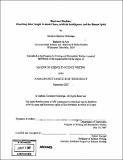| dc.contributor.advisor | Robert Kanigel. | en_US |
| dc.contributor.author | Hoekenga, Barbara Christine | en_US |
| dc.contributor.other | Massachusetts Institute of Technology. Graduate Program in Science Writing. | en_US |
| dc.date.accessioned | 2008-09-03T14:43:06Z | |
| dc.date.available | 2008-09-03T14:43:06Z | |
| dc.date.issued | 2007 | en_US |
| dc.identifier.uri | http://hdl.handle.net/1721.1/42144 | |
| dc.description | Thesis (S.M. in Science Writing)--Massachusetts Institute of Technology, Dept. of Humanities, Graduate Program in Science Writing, 2007. | en_US |
| dc.description | "September 2007." | en_US |
| dc.description | Includes bibliographical references (leaves 44-49). | en_US |
| dc.description.abstract | On May 11th 1997, the world watched as IBM's chess-playing computer Deep Blue defeated world chess champion Garry Kasparov in a six-game match. The reverberations of that contest touched people, and computers, around the world. At the time, it was difficult to assess the historical significance of the moment, but ten years after the fact, we can take a fresh look at the meaning of the computer's victory. With hindsight, we can see how Deep Blue impacted the chess community and influenced the fields of philosophy, artificial intelligence, and computer science in the long run. For the average person, Deep Blue embodied many of our misgivings about computers becoming our new partners in the information age. For researchers in the field it was emblematic of the growing pains experienced by the evolving field of AI over the previous half century. In the end, what might have seemed like a definitive, earth-shattering event was really the next step in our on-going journey toward understanding mind and machine. While Deep Blue was a milestone - the end of a long struggle to build a masterful chess machine - it was also a jumping off point for other lines of inquiry from new supercomputing projects to the further development of programs that play other games, such as Go. Ultimately, the lesson of Deep Blue's victory is that we will continue to accomplish technological feats we thought impossible just a few decades before. And as we reach each new goalpost, we will acclimate to our new position, recognize the next set of challenges before us, and push on toward the next target. | en_US |
| dc.description.statementofresponsibility | by Barbara Christine Hoekenga. | en_US |
| dc.format.extent | 49 leaves | en_US |
| dc.language.iso | eng | en_US |
| dc.publisher | Massachusetts Institute of Technology | en_US |
| dc.rights | M.I.T. theses are protected by
copyright. They may be viewed from this source for any purpose, but
reproduction or distribution in any format is prohibited without written
permission. See provided URL for inquiries about permission. | en_US |
| dc.rights.uri | http://dspace.mit.edu/handle/1721.1/7582 | en_US |
| dc.subject | Graduate Program in Science Writing. | en_US |
| dc.title | Mind over machine : what Deep Blue taught us about chess, artificial intelligence, and the human spirit | en_US |
| dc.type | Thesis | en_US |
| dc.description.degree | S.M.in Science Writing | en_US |
| dc.contributor.department | Massachusetts Institute of Technology. Graduate Program in Science Writing | en_US |
| dc.contributor.department | MIT Program in Writing & Humanistic Studies | |
| dc.identifier.oclc | 228413902 | en_US |
